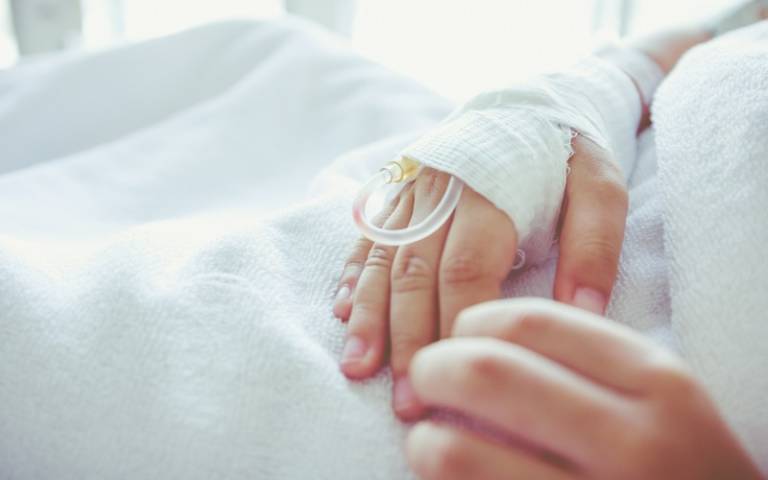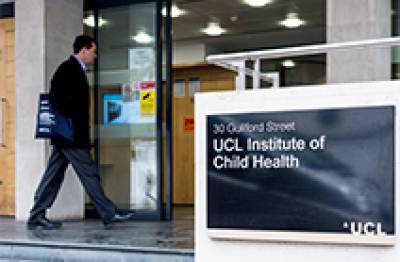Genetic clues could predict leukaemia patients’ risk of treatment failure
5 May 2023
New research led by UCL and Great Ormond Street Hospital (GOSH) to predict which childhood leukaemia patients are at higher risk of not responding well to chemotherapy will allow clinicians to refine treatment strategies to give the best chance of success.

The study, published in the Journal of Clinical Oncology, combined UK trial data from 2003-2019 to see which patients had worse outcomes. They then used whole genome sequencing to look for genetic clues that could be used to predict this risk in future patients.
The team hope that these genetic clues can be used to identify high-risk patients early, who may be eligible to take part in trials for the latest immunotherapies, such as CAR-T cell therapy.
Acute lymphoblastic leukaemia (ALL) is the main type of childhood leukaemia and is split into two subtypes, B-Cell ALL (B-ALL) and T-Cell ALL (T-ALL). The current conventional therapies for ALL include induction chemotherapy and bone marrow transplant. But patients are three times more likely to not respond well to therapy and suffer poor outcomes in T-ALL compared with B-ALL, and there are fewer treatment options available when patients relapse.
This may be about to change, with trials underway for highly promising immunotherapies such as CAR-T cell therapy. This technique was recently used by scientists at UCL and GOSH to treat a patient’s ‘incurable’ T-ALL leukaemia after conventional treatments had failed. Though the trial continues, the patient is still cancer free almost a year after starting treatment.
In the new study, the team analysed data from two clinical trials that involved ALL patients treated in the UK between 2003 and 2019, to see what happened to the patients and identify the risk factors associated with conventional treatment failure.
Frozen cells from these trial patients were then whole genome sequenced in order to look for genetic markers associated with poor outcomes, and which might be used to predict the risk of conventional treatment failure in future patients.
The researchers found that one in five older patients, in this case teenagers and young adults, experienced poor outcomes compared to just one in ten younger patients.
Though the genetic profile of the cancers they studied was complex, with individual cancers often very different from one another, the researchers found that mutations in the TAL1, MYC and RAS molecular pathways could be used to quantify a patient’s risk of treatment failure.
Dr David O’Connor (UCL Cancer Institute and Great Ormond Street Hospital) said: “Genetic stratification, where you analyse a patient’s genome to assess their risk of certain outcomes, has been successfully used to improve B-ALL treatment. But until now we haven’t had the data to do this for T-ALL. Our results could identify a group of high-risk patients who are less likely to respond well to chemotherapy. All childhood leukaemia patients in the UK undergo whole genome sequencing when they are diagnosed, so the genetic information should already be available to do this.”
Genetic stratification of patients to identify those who are less likely to respond well to conventional treatments would mean that they could be considered for alternatives, such as the CAR-T cell therapies that are now available in clinical trials.
Professor Marc Mansour (UCL Great Ormond Street Institute of Child Health and UCL Cancer Institute) said: “Around 10% of paediatric T-ALL patients do not respond to initial chemotherapy and the chance of relapse is twice as high as in B-ALL. This is compounded by the fact that there are fewer treatment options for relapsed T-ALL patients. So in T-ALL it’s even more important to provide the treatment that will give the highest chances of remission. The genetic markers that we’ve identified in this study will allow us to provide the best treatment strategy.”
This research was funded by Blood Cancer UK, Cancer Research UK, GOSH Children’s Charity and Wellcome.
Links
- Professor Marc Mansour's academic profile
- Dr David O'Connor's academic profile
- UCL Great Ormond Street Insitute of Child Health Developmental Biology and Cancer Research and Teaching Department
- Faculty of Population Health Sciences
- UCL Cancer Institute
- Faculty of Medical Sciences
- Great Ormond Street Hospital for Children
Image
Saline intravenous (iv) drip in a child's patient hand. Credit: kdshutterman on iStock
Media contact
Dr Matt Midgley
E: m.midgley [at] ucl.ac.uk
 Close
Close


